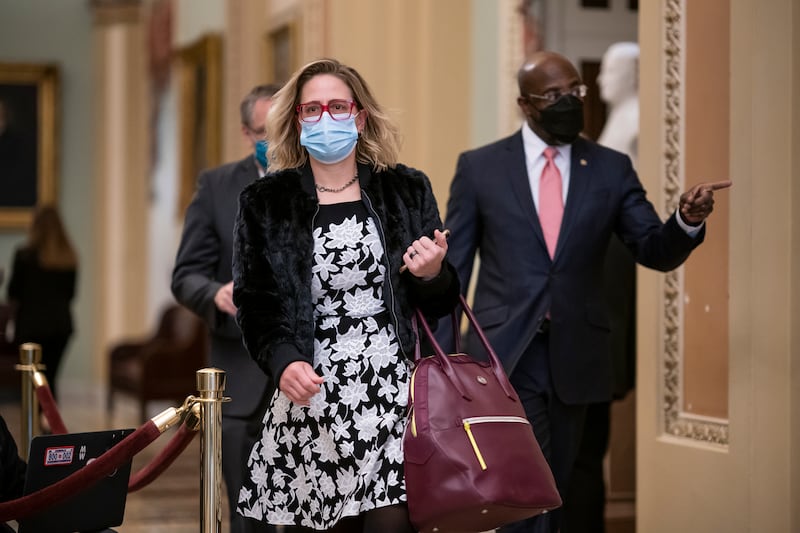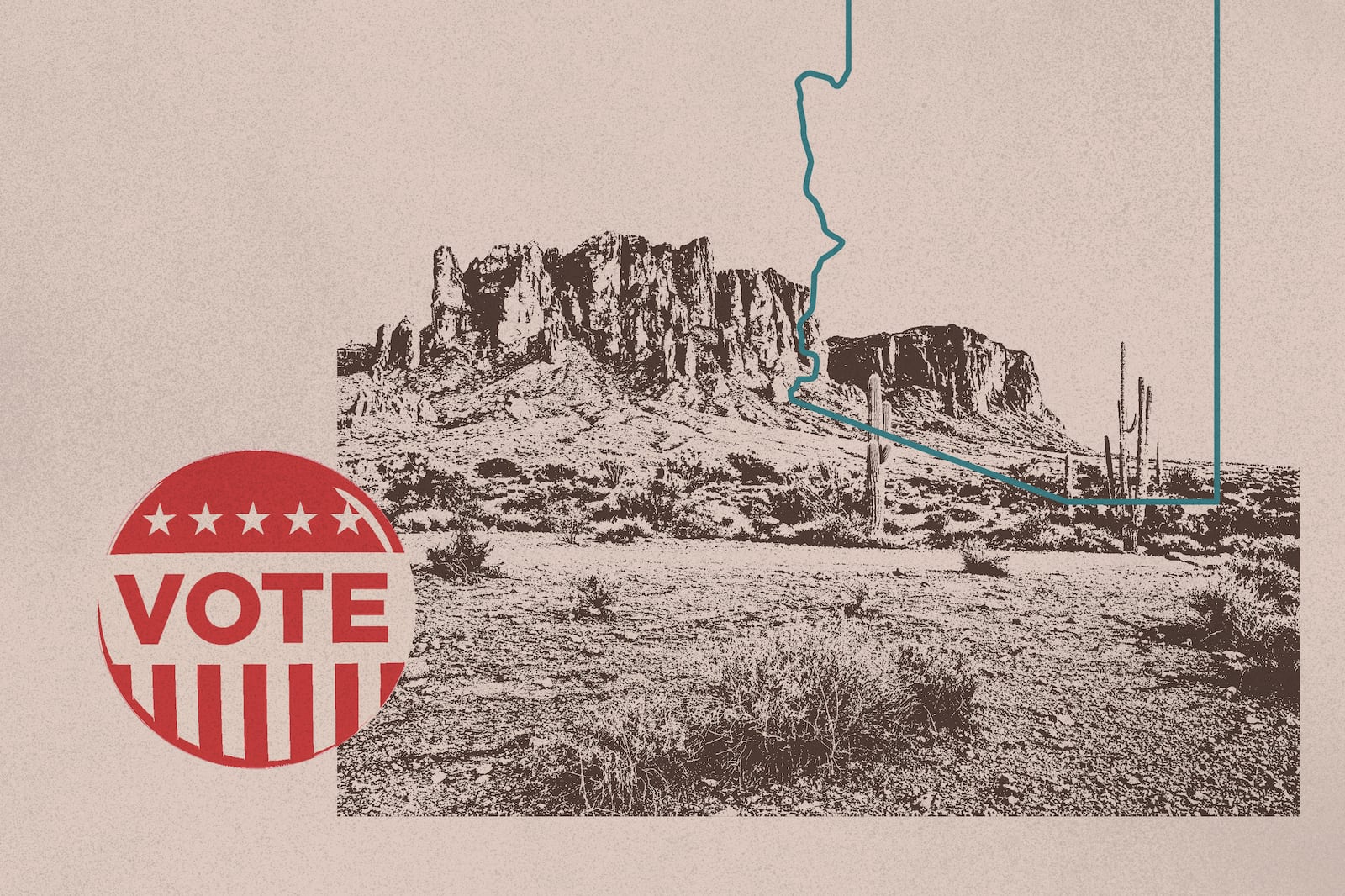On paper, Arizona has become one of America’s newest blue states, as Democratic candidates ended yearslong Republican winning streaks in Senate and presidential elections over the past two years. On the ground, though, many parts of the state still feel very red.
Drive around the Phoenix metro area, and you’ll spot plenty of Trump 2020 bumper stickers and maybe a “Don’t California My Arizona” decal. On Tuesday morning at a coffee shop in Gilbert in the state’s conservative 5th Congressional District east of Phoenix, most customers ignored a sign recommending masks, and a bearded man wearing socks and sandals had a firearm conspicuously holstered to the waistband of his sweatpants as he ordered.
The conservative vibe isn’t just anecdotal: Registered Republicans still outnumber registered Democrats in the state by more than 120,000 voters, according to data from the Arizona secretary of state.
The formula that’s worked for Democrats since 2018, though, is running as moderates. In a state as narrowly divided as Arizona, staying in the middle can put you over the top.
Arizona has long been forecast as a future battleground state because of changing demographics, but the trend accelerated in recent years. In 2012, Republican presidential nominee Mitt Romney won the state by 10%, but the party’s advantage eroded under former President Donald Trump, who won Arizona in 2016 by 3.5% and lost in 2020 by .3%.
“If you run statewide for an office like ‘mine inspector,’ which we have one of those, and you’re a Republican, that’s enough, just an R behind your name is enough to get elected,” said former Sen. Jeff Flake, who represented the state from 2013 to 2019 and as a congressman from 2001 to 2013. “But, and this is a big but, if you’re seen as a Trump kind of Republican, then you’re at a disadvantage statewide and likely won’t win.”
The idea that Arizona is still a conservative state despite recent Democratic victories bears itself out with how newly elected statewide Democrats are behaving in office.
Democratic Sens. Kyrsten Sinema and Mark Kelly both beat former Sen. Martha McSally, a Trump-friendly Republican, by running centrist campaigns, and they continue to burnish their moderate credentials in Congress. Kelly, who’s up for reelection next year, called out President Joe Biden after his address to Congress for not offering a plan to address “the immediate crisis at the border.” And Sinema voted against including a $15 minimum wage in the COVID-19 relief package and opposes getting rid of the filibuster, which would allow Democrats to pass legislation with a simple majority.

“I think the Republican Party is in a world of hurt in Arizona, a real world of hurt,” said Daniel Barker, a retired Arizona Court of Appeals judge who co-founded the group Arizona Republicans Who Believe in Treating Others with Respect, which backed Biden last year. “I think they badly underestimated the impact of, for instance, this so-called audit.”
The audit of 2020 election results in Maricopa County, the state’s most populous, was initiated by state Senate Republicans. Meant to assuage voters concerned over unproven election integrity issues pushed by Trump, the audit has also worried some Republicans. Among them is Bill Gates, Maricopa County election supervisor, who told the New York Times that accusations of fraud make “no sense” since elected Republicans helped supervise the election and certify the results.
Gates said he fears the audit “is further tearing at the foundations of our democracy.”
Republican state Sen. Paul Boyer, who initially backed the audit, has reversed course, telling the Times “It makes us look like idiots.” The audit will be put on pause Thursday because of scheduled school graduation ceremonies at Veterans Memorial Coliseum where ballots are being recounted.
“It seems like Arizona is becoming this laughing stock on the news,” said Kim Fridkin, a professor of political science at Arizona State University. “‘Oh, look what’s going on in Arizona, they’re trying to change the election results.’”
Republican are also working to pass new voter laws. GOP Gov. Doug Ducey signed legislation Tuesday that will remove voters from early voting rolls if they don’t vote in two election cycles and respond to a notice from county officials.
The legislation was opposed by state business leaders including Arizona Cardinals owner Michael Bidwill and Navajo Nation President Jonathan Nez, but Ducey said in a video message the law was more accommodating than measures in liberal states like California and New York, and that it would “free up resources for county recorders.”
Arizona remains a conservative state, but the fallout from Trump and his unfound claims of a fraudulent election seems to have at least temporarily negated Republicans’ advantage. Since January, more than 23,000 Arizona Republicans have left the party, per secretary of state data, compared with about 6,000 Democrats leaving their fold.
For now, the path to statewide office in Arizona runs through the middle, and some think that playbook could work in some of the state’s most Republican districts, too. Barker, the retired judge, said he’s working with a group to find a challenger to Rep. Andy Biggs, a Republican who represents the 5th District and who voted against certifying Biden’s electoral win. Barker’s confident a candidate in the vein of Sinema or Kelly would succeed.
“It’s not somebody that [voters are] going to be concerned about, that’s going to be adopting a program that AOC would want, that progressives would want,” he said. “It’s someone who’s going to be independent.”

